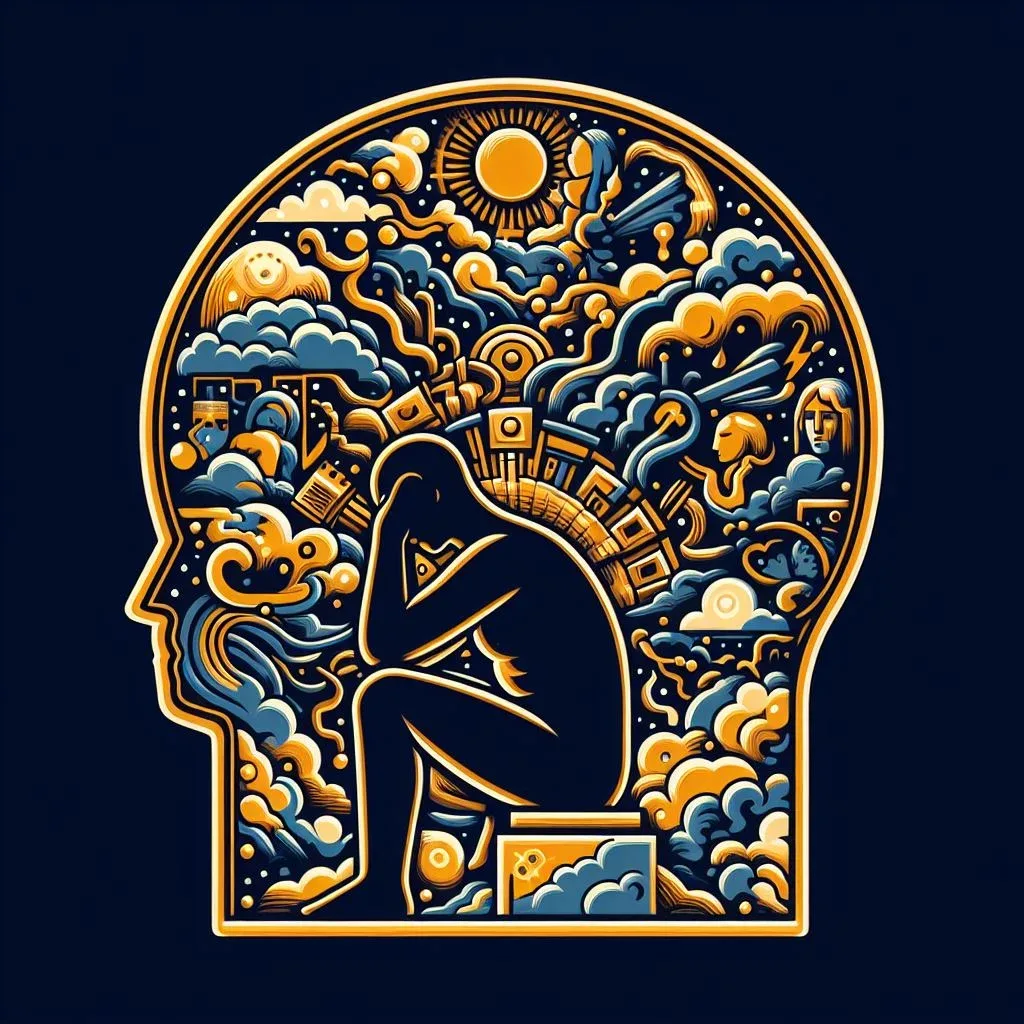A pursuit of excellence and success is inherent to human nature, but self-collection excessive can lead to stress and negative impacts on mental health. O stoicism offers valuable insights for dealing with self-collection in a healthy and balanced way.
Os risks of self-collection excessive are stress, anxiety, low self esteem, Burnout syndrome, impact on mental health e reduced creativity. O stoicism teaches the search for virtue, acceptance of limitations human and focus on the process.

Main points
- A self-collection excessive can lead to stress chronic and anxiety.
- Self-harm is associated with an increased risk of mental health problems.
- O stoicism offers a balanced perspective for dealing with self-harm.
- To establish realistic goals and practice the gratitude help you deal with self-control in a healthy way.
- Balanced self-control can promote personal development and the .
The Risks of Excessive Self-Collection
Excessive self-demand can have significant negative consequences for mental and emotional health. By imposing unrealistic pressures and expectations, we can expose ourselves to a range of risks, including chronic stress, anxiety, low self esteem, Burnout syndrome, impact on mental health e reduced creativity.
Stress and anxiety are some of the main consequences of excessive self-demand. By constantly demanding perfect results, we can overload ourselves emotionally, leading to high levels of stress and anxiety. These conditions can negatively affect our mental and emotional health, interfering with our ability to deal with everyday challenges and enjoy moments of tranquility.

Excessive self-demand can also lead to low self esteem. By constantly comparing ourselves to others or to unrealistic standards, we run the risk of feeling inadequate and insufficient. This feeling of inadequacy can undermine our confidence in our abilities and achievements, damaging our self-esteem and .
Furthermore, excessive self-demand is associated with Burnout syndrome, a state of physical, emotional and mental exhaustion caused by prolonged exhaustion. By pushing ourselves too hard and dedicating ourselves intensely to achieving goals and results, we run the risk of ignoring our needs for rest and self-care, leading to overload that can lead to burnout.
The Impact on Mental Health and Reduced Creativity
“Excessive self-demand can be an obstacle to creativity and innovation.”
Excessive self-harm can also have a significant impact on our mental health. By imposing high standards and unattainable goals on ourselves, we can feel constantly frustrated and dissatisfied, which can lead to problems such as depression and anxiety disorders.
Furthermore, this incessant search for results can limit our creativity. By focusing only on the end goals, we can neglect the creative process and the possible solutions and innovative ideas that may emerge along the way. Excessive self-demand can leave us trapped in a mindset of perfectionism, preventing us from experimenting and taking risks in search of creative solutions.

In short, excessive self-demand brings with it a series of risks for our mental and emotional health. Stress, anxiety, low self-esteem, burnout syndrome and reduced creativity are just some of the negative consequences of this behavior. In the next segment, we'll explore how stoicism can help us deal with self-harm in a healthy way.
Self-control and Stoicism: A Necessary Balance
Stoicism offers a balanced perspective for dealing with self-harm. This philosophy values pursuit of excellence and self-control, but also understands the importance of accepting human limitations and the uncertainties of life. By adopting a stoic approach to self-harm, it is possible to find a balance healthy and avoid damage caused by excessive stress.

A self-criticism It is a natural part of the personal growth process. Seeking excellence is something positive, as it motivates us to achieve our goals and develop our skills. However, when self-demand becomes excessive, it can become a heavy burden, leading to stress and a constant feeling of dissatisfaction. This is where Stoicism offers important insight.
The Stoics recognize the importance of pursuit of excellence, but they also understand that there are limitations and uncertainties in life. They teach that we should focus on the process, the effort and the virtue, instead of just getting attached to the end results. This allows us to adopt a healthier and more realistic perspective regarding self-control. Instead of worrying only about the end result, we learn to value the process and personal growth that occurs along the way.
Therefore, by balancing the pursuit of excellence with acceptance of our human limitations, we can deal with self-demand in a healthier way. Stoicism teaches us to cultivate virtues such as resilience, self-control and gratitude. These practices help us reduce stress, find a balance emotional and promote personal development in a healthy and sustainable way.

The role of virtue in the pursuit of excellence
The pursuit of excellence involves not only achieving results, but also cultivating personal virtues. Stoicism highlights the importance of virtue in the process of personal growth. By emphasizing values such as courage, wisdom, and justice, Stoicism helps us develop a sense of purpose and find meaning in our actions. In this way, self-demand becomes more than just a search for results, but an opportunity to cultivate virtues and evolve as individuals.
| Benefits of balancing self-control and stoicism | Risks of excessive self-demand |
|---|---|
| Increased emotional resilience | Chronic stress |
| Developing a realistic approach to results | Anxiety |
| Promoting a sense of gratitude and appreciation for the process | Low self esteem |
| Improved mental and emotional health | Burnout syndrome |
Find one balance Between self-control and stoicism does not mean giving up goals and ambitions. On the contrary, it means adopting a healthier and more realistic approach to results, valuing the process and personal growth. By focusing on virtue, accepting human limitations and seek excellence in a balanced way, it is possible to deal with self-demand in a healthy way and promote mental and emotional.
Dealing with Self-Demand in a Stoic Way
To deal with self-demand in a stoic way, it is important to establish realistic goals and practice the self-acceptance. Focusing on the process, rather than just the end results, helps reduce internal pressure and cultivate a more balanced approach to self-control.
When establishing realistic goals, it is important to consider human limitations and external circumstances. Recognize that not everything is under your absolute control and that things will not always go as planned. Therefore, adopting a stance of acceptance of limitations It is essential to deal with self-control in a healthy way.

Additionally, focusing on the process and dedicated effort, rather than just the end results, helps you appreciate the small victories along the way. Celebrate achievements and learn from failures, developing a more compassionate approach towards yourself.
Finally, practicing gratitude for what has already been achieved helps to reduce internal pressure and cultivate a positive mindset. Recognize the progress made so far and value the experiences along the self-collection journey.

Example of realistic goals:
| Objective | Action plan |
|---|---|
| Perform physical exercise regularly | Establish a weekly training routine and start with shorter, less intense sessions, gradually increasing as your body adapts. |
| Develop skills in a new language | Participate in online classes or courses, practice reading and writing daily, and seek opportunities for immersion in the language, such as talking to native speakers. |
| Complete a professional project | Break the project into smaller steps, set realistic deadlines for each step, and seek support from colleagues or mentors for feedback and guidance throughout the process. |
By adopting these practices, it is possible to deal with self-demand in a healthier way, promoting self-development without compromising mental health and emotional well-being.
Finding Balance in Personal Development
The search for personal development It's a journey many of us embark on in search of growth and success. However, it is important to find a healthy balance in this process to ensure mental health and well-being.
O healthy self-control plays a fundamental role in this search for balance. It motivates us to achieve our goals and strive for excellence, but without putting excessive pressure on ourselves. When we charge ourselves in a healthy way, we recognize our achievements and failures with compassion, adjust our expectations so that they are realistic, and allow ourselves to enjoy the process of growth.

To find this balance, it is essential to prioritize self-care and self-compassion. This means listening to the needs of our body and mind, and respecting our limits. Practicing relaxation techniques, such as meditation and physical exercise, can be helpful in relieving stress and promoting emotional well-being. Furthermore, it is important to cultivate healthy relationships and value moments of leisure and rest.
However, it is essential to remember that balance is a constant and individual journey. What works for one person may not work for another. Therefore, it is essential to explore different strategies and find the ones that best suit our needs and lifestyle. Finding balance in personal development is an ongoing process that requires self-reflection and constant adjustments.

The Importance of Self-Knowledge in Personal Development
One of the fundamental pillars of personal development is self-knowledge. Knowing our abilities, limitations, values and passions is essential to make decisions aligned with our goals and enjoy an authentic and meaningful growth process.
Self-knowledge allows us to identify our strengths and areas for improvement, enabling us to direct our efforts towards developing relevant skills. Furthermore, it helps us set realistic expectations for ourselves and avoid excessive self-demand, focusing on what is truly important to our happiness and success.
To develop self-knowledge, it is helpful to dedicate time to self-reflection and practice self-questioning. Questions like “What are my values?”, “What are my greatest talents?” and “What brings me happiness and fulfillment?” They can help us discover more about ourselves and make decisions that align with who we really are.
How to Align Self-Care with Well-Being
To achieve a healthy self-control and balanced, it is important to align our expectations with our well-being. This means prioritizing our mental and emotional health above external results or social pressures.
An effective approach is to set realistic and adjustable goals that take into account our resources and limitations. This way, we avoid excessive self-demand and allow ourselves to enjoy the growth process, instead of focusing only on the final results.

Furthermore, it is essential to value and celebrate our achievements, no matter how small they may be. Recognizing our efforts and progress helps us maintain motivation and cultivate a positive attitude towards ourselves. Gratitude also plays an important role in allowing us to focus on what we already have and appreciate the little things in life.
| Benefits of Healthy Self-Charge | Signs of Excessive Self-Duty |
|---|---|
| – Motivation for personal growth | – Chronic stress |
| – Increased self-confidence | – Constant anxiety |
| – Improved resilience | - Low self-esteem |
| – Greater sense of purpose | – Emotional exhaustion |
Finding balance in personal development is a challenging but rewarding process. When we adopt a healthy self-control, aligned with our well-being, we can promote genuine personal growth and a fuller, more satisfying life.
Conclusion
Stoicism offers valuable lessons for dealing with self-control in a healthy and balanced way. By seeking excellence with acceptance of limitations e focus on the process, it is possible to find a balance in personal development and promote mental health and well-being.
Self-demand can be a motivating force when balanced, but it is important to avoid excessive pressure and cultivate a compassionate and realistic approach to individual expectations. Stoicism teaches us to accept that not everything is under our control, but we can control our reactions and efforts.

By adopting a stoic perspective, we recognize that personal growth is not linear and that failures and obstacles are part of the path. The balance between the pursuit of excellence and acceptance of limitations helps us cultivate a resilient mindset and deal with self-demand in a healthier way.
FAQ
Q: How can excessive self-harm negatively impact mental health?
A: Excessive self-demand can lead to chronic stress, anxiety, low self-esteem, burnout syndrome, impact on mental health and reduced creativity.
Q: What is stoicism and how can it help deal with self-harm?
A: Stoicism is a philosophy that values self-mastery, serenity, and the pursuit of virtue. It offers a balanced perspective for dealing with self-demand, accepting human limitations and focusing on the process.
Q: How to deal with self-harm in a stoic way?
A: It is important to set realistic goals, recognize achievements and failures with compassion, focus on the process and effort, accept human limitations and practice gratitude for what has already been achieved.
Q: Why is it important to find a balance in personal development?
A: Finding balance in personal development helps promote mental health and well-being, avoiding the negative impacts of excessive self-demand.







